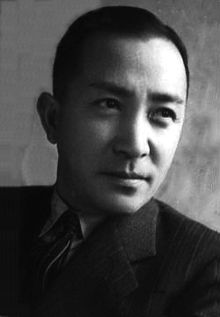Tsumasaburō Bandō
| Tsumasaburō Bandō | |
|---|---|
 |
|
| Born |
Denkichi Tamura December 13, 1901 Kodenmacho Nihonbashi, Tokyo, Japan |
| Died | July 7, 1953 (aged 51) Japan |
| Occupation | film actor |
| Years active | 1923–1953 |
Tsumasaburō "Bantsuma" Bandō (阪東 妻三郎 Bandō Tsumasaburō?, December 13, 1901 – July 7, 1953) was one of the most prominent Japanese actors of the twentieth century. Famous for his rebellious, sword fighting roles in many jidaigeki silent films, he rose to fame after joining the Tōjiin Studio of Makino Film Productions in Kyoto in 1923.
Bantsuma, birth name Denkichi Tamura, was born in Kodenmachō, Nihonbashi, Tokyo. Bantsuma’s father, a cotton wholesaler named Chōgorō, lived till the age of 71 but his mother, older brother, and sister died when he was young. He attended Jisshi Elementary School (which stands next to the former site of Denma-chō Prison where many the loyal supporters of the Emperor, whom he frequently played in his films, were deeply involved). At school, he was often the leader of the pack and was actively involved in plays. While performing in a school play, Bantsuma froze on stage, unable to recite his lines. Embarrassed, he ran off and stayed in his room, weeping for 10 days. It is said that during this time, he vowed to become someone who would be admired by all.
After the death of his mother, his father’s business soon went bankrupt and Bantsuma was unable to continue his education. After finishing elementary school, he became an apprentice and pupil to Kataoka Nizaemon, a famous kabuki actor. However, in the world of kabuki, lineage was extremely important and Bantsuma struggled to gain fame. He soon changed his artistic direction by joining small theaters and taking small roles at Kokkatsu production firm. In 1922, with Kichimatsu Nakamura, he formed the “Bando Tsumasaburo Troupe,” but it was disbanded very quickly. In 1923, Bantsuma and Kichimatsu were scouted into the film industry by Makino Film Studio.
...
Wikipedia
